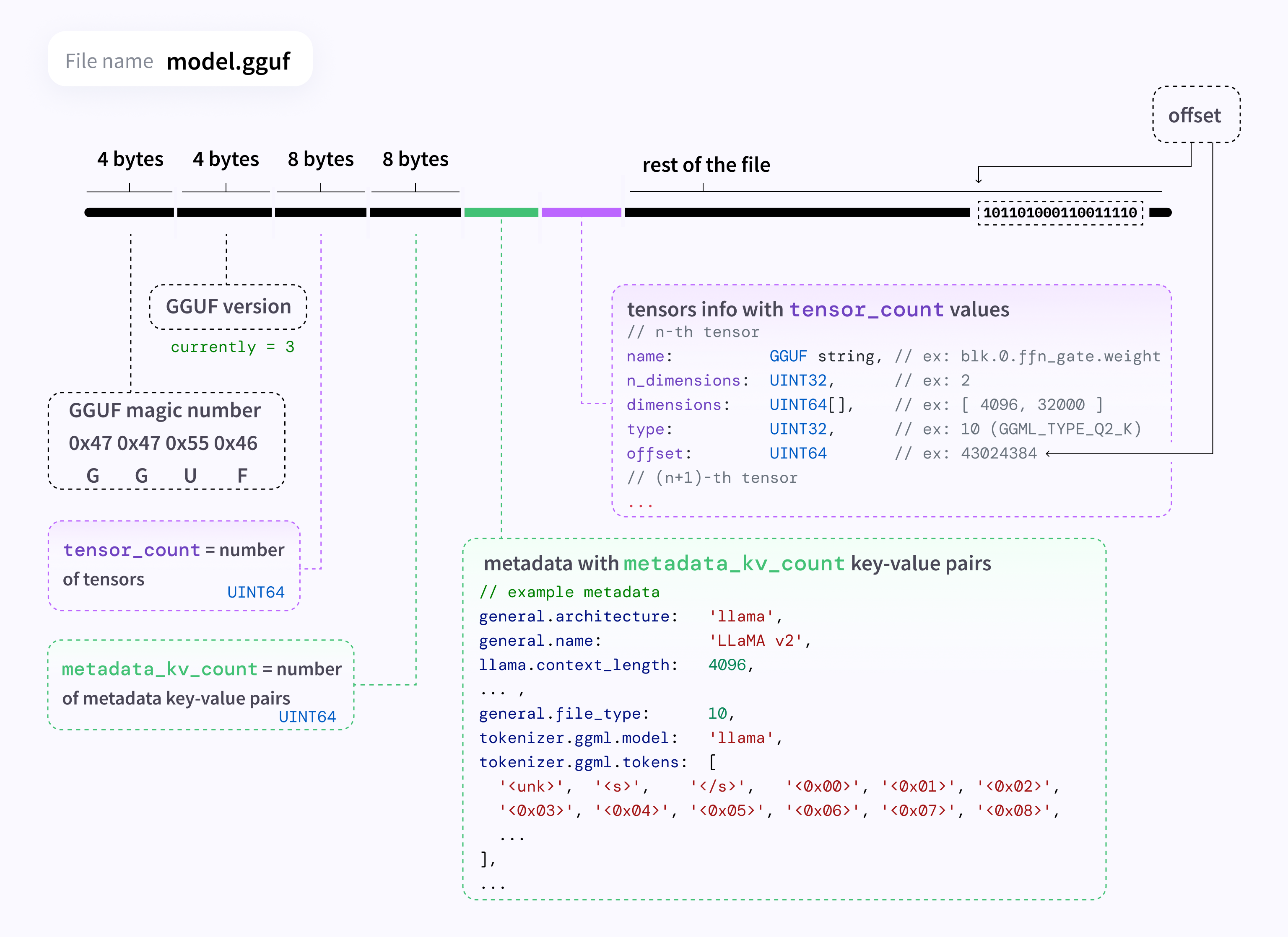@huggingface/gguf
A GGUF parser that works on remotely hosted files.
Spec

Spec: https://github.com/ggerganov/ggml/blob/master/docs/gguf.md
Reference implementation (Python): https://github.com/ggerganov/llama.cpp/blob/master/gguf-py/gguf/gguf_reader.py
Install
npm install @huggingface/gguf
Usage
Basic usage
import { GGMLQuantizationType, gguf } from "@huggingface/gguf";
const URL_LLAMA = "https://huggingface.co/TheBloke/Llama-2-7B-Chat-GGUF/resolve/191239b/llama-2-7b-chat.Q2_K.gguf";
const { metadata, tensorInfos } = await gguf(URL_LLAMA);
console.log(metadata);
console.log(tensorInfos);
Reading a local file
const { metadata, tensorInfos } = await gguf(
'./my_model.gguf',
{ allowLocalFile: true },
);
Strictly typed
By default, known fields in metadata are typed. This includes various fields found in llama.cpp, whisper.cpp and ggml.
const { metadata, tensorInfos } = await gguf(URL_MODEL);
if (metadata["general.architecture"] === "llama") {
console.log(model["llama.attention.head_count"]);
console.log(model["mamba.ssm.conv_kernel"]);
}
Disable strictly typed
Because GGUF format can be used to store tensors, we can technically use it for other usages. For example, storing control vectors, lora weights, etc.
In case you want to use your own GGUF metadata structure, you can disable strict typing by casting the parse output to GGUFParseOutput<{ strict: false }>:
const { metadata, tensorInfos }: GGUFParseOutput<{ strict: false }> = await gguf(URL_LLAMA);
Command line interface
This package provides a CLI equivalent to gguf_dump.py script. You can dump GGUF metadata and list of tensors using this command:
npx @huggingface/gguf my_model.gguf
Example for the output:
* Dumping 36 key/value pair(s)
Idx | Count | Value
----|--------|----------------------------------------------------------------------------------
1 | 1 | version = 3
2 | 1 | tensor_count = 292
3 | 1 | kv_count = 33
4 | 1 | general.architecture = "llama"
5 | 1 | general.type = "model"
6 | 1 | general.name = "Meta Llama 3.1 8B Instruct"
7 | 1 | general.finetune = "Instruct"
8 | 1 | general.basename = "Meta-Llama-3.1"
[truncated]
* Dumping 292 tensor(s)
Idx | Num Elements | Shape | Data Type | Name
----|--------------|--------------------------------|-----------|--------------------------
1 | 64 | 64, 1, 1, 1 | F32 | rope_freqs.weight
2 | 525336576 | 4096, 128256, 1, 1 | Q4_K | token_embd.weight
3 | 4096 | 4096, 1, 1, 1 | F32 | blk.0.attn_norm.weight
4 | 58720256 | 14336, 4096, 1, 1 | Q6_K | blk.0.ffn_down.weight
[truncated]
Alternatively, you can install this package as global, which will provide the gguf-view command:
npm i -g @huggingface/gguf
gguf-view my_model.gguf
Hugging Face Hub
The Hub supports all file formats and has built-in features for GGUF format.
Find more information at: http://hf.co/docs/hub/gguf.
Acknowledgements & Inspirations
🔥❤️




